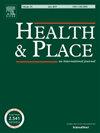Powering well-being: Energy independence and mental health in a zone of ongoing disasters
IF 3.8
2区 医学
Q1 PUBLIC, ENVIRONMENTAL & OCCUPATIONAL HEALTH
引用次数: 0
Abstract
The archipelago of Puerto Rico has faced multiple natural disasters, including hurricanes and earthquakes, disrupting the mental health and daily lives of its residents. These disasters, combined with socio-political abandonment, have led to the deterioration of the electrical grid, exacerbating health disparities. This study aimed to explore the linkages between natural and structural disasters, mental health, and energy independence in Puerto Rico. In this setting, the community organization Casa Pueblo has installed solar panels in the homes of people with chronic health conditions. Through ethnographic fieldwork in the town of Adjuntas and qualitative interviews with 45 individuals with different levels of access to solar power, we explore the implications of ongoing natural and structural disasters on the mental health of individuals and how access to solar energy could help mitigate their effects. Results indicate that participants with direct and indirect access to solar panels held positive and hopeful narratives regarding their mental well-being and quality of life. This innovative model of communal energy security through solar power for climate adaptation holds promises for enhancing mental health in the town of Adjuntas and potentially in other regions.
促进健康:持续灾害地区的能源独立和心理健康。
波多黎各群岛面临着包括飓风和地震在内的多重自然灾害,扰乱了居民的心理健康和日常生活。这些灾害,加上社会政治遗弃,导致电网恶化,加剧了保健差距。本研究旨在探讨波多黎各自然灾害和结构性灾害、心理健康和能源独立之间的联系。在这种情况下,社区组织Casa Pueblo在慢性病患者的家中安装了太阳能电池板。通过在Adjuntas镇的民族志田野调查和对45名不同程度获得太阳能的人的定性访谈,我们探讨了持续的自然灾害和结构性灾害对个人心理健康的影响,以及获得太阳能如何有助于减轻其影响。结果表明,直接和间接接触太阳能电池板的参与者对他们的心理健康和生活质量持积极和充满希望的态度。这种通过太阳能为气候适应提供公共能源安全的创新模式有望改善Adjuntas镇以及其他地区的心理健康。
本文章由计算机程序翻译,如有差异,请以英文原文为准。
求助全文
约1分钟内获得全文
求助全文
来源期刊

Health & Place
PUBLIC, ENVIRONMENTAL & OCCUPATIONAL HEALTH-
CiteScore
7.70
自引率
6.20%
发文量
176
审稿时长
29 days
期刊介绍:
he journal is an interdisciplinary journal dedicated to the study of all aspects of health and health care in which place or location matters.
 求助内容:
求助内容: 应助结果提醒方式:
应助结果提醒方式:


